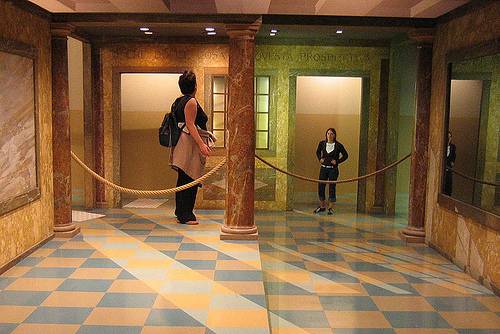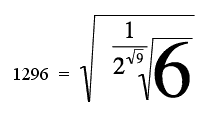barbermonger
n. a vain man
The Prisoners’ Paradox
Three condemned prisoners share a cell. A guard arrives and tells them that one has been pardoned.
“Which is it?” they ask.
“I can’t tell you that,” says the guard. “I can’t tell a prisoner his own fate.”
Prisoner A takes the guard aside. “Look,” he says. “Of the three of us, only one has been pardoned. That means that one of my cellmates is still sure to die. Give me his name. That way you’re not telling me my own fate, and you’re not identifying the pardoned man.”
The guard thinks about this and says, “Prisoner B is sure to die.”
Prisoner A rejoices that his own chance of survival has improved from 1/3 to 1/2. But how is this possible? The guard has given him no new information. Has he?
(In Mathematical Ideas in Biology [1968], J. Maynard Smith writes, “This should be called the Serbelloni problem since it nearly wrecked a conference on theoretical biology at the villa Serbelloni in the summer of 1966.”)
Writing Weather

1816 is known as “the year without a summer” — the eruption of Indonesia’s Mount Tambora flung huge amounts of volcanic dust into the atmosphere, dropping temperatures worldwide and giving the sky a sallow cast that’s visible in Turner’s landscapes of the period (above).
It was a great calamity for farmers, but a boon for horror literature — the “wet, ungenial summer” forced Mary Shelley and John Polidori indoors on their Swiss holiday, where they wrote both Frankenstein and The Vampyre.
Oops
In 1800, robber and housebreaker Pierre Coignard was sentenced to 14 years’ hard labor in the prison at Toulon. After five years he escaped, journeyed to Catalonia, assumed the identity of a local nobleman, won glory fighting in the Spanish ranks, entered the French army, rose to become a decorated colonel …
… and was recognized in Paris by one of his former cellmates.
He was tried, convicted, and returned to the same prison he had escaped 18 years earlier.
The Triple Deal
Take any twenty-one cards, and ask a person to choose one from them. [Deal] them in three heaps, and ask the person who selected the card in which heap it is placed. Gather them up, and put the heap containing the chosen card between the other two. Do this twice more, and the chosen card will be found the eleventh from the top.
— Alfred Elliott, The Playground and the Parlour, 1868
Narcissistic Numbers
A Broken Rule
Exceptions to “I before E …”:
albeit, beige, counterfeit, deity, either, feisty, height, kaleidoscope, leisure, neighbor, obeisance, protein, reveille, seize, veil, weird, zeitgeist
“… except after C”:
ancient, concierge, efficient, financier, glacier, juicier, democracies, species
Will Rogers said, “Nothing you can’t spell will ever work.”
Temp Work
Strapped for cash in the mid-1950s, Kurt Vonnegut took a job at Sports Illustrated, though he “didn’t care or know squat about sports.”
They asked him to write a piece about a racehorse that had jumped the fence at the local track.
He fed a page into his typewriter, stared at it for several hours, typed “The horse jumped over the fucking fence” and left.
The Honi Phenomenon

Here’s a familiar illusion known as the Ames room. The woman on the right is not really small, she’s just far away. The room is a trapezoid but is designed to appear square when viewed from this angle.
Curiously, a woman who loves and trusts her husband tends to see no change in him even as he walks from corner to corner; apparently she resists a distorted view of him.
The same is not true of men.
No Comment
A good American misprint was the following, which is warranted as true and genuine. It occurred in the proof-sheets of a scientific treatise. The sentence, as written by the author, ran as follows: ‘Filtration is sometimes assisted by the use of albumen.’ This came out as: ‘Flirtation is sometimes arrested by the use of aldermen.’
— Patrick Maxwell, Pribbles and Prabbles, 1906




